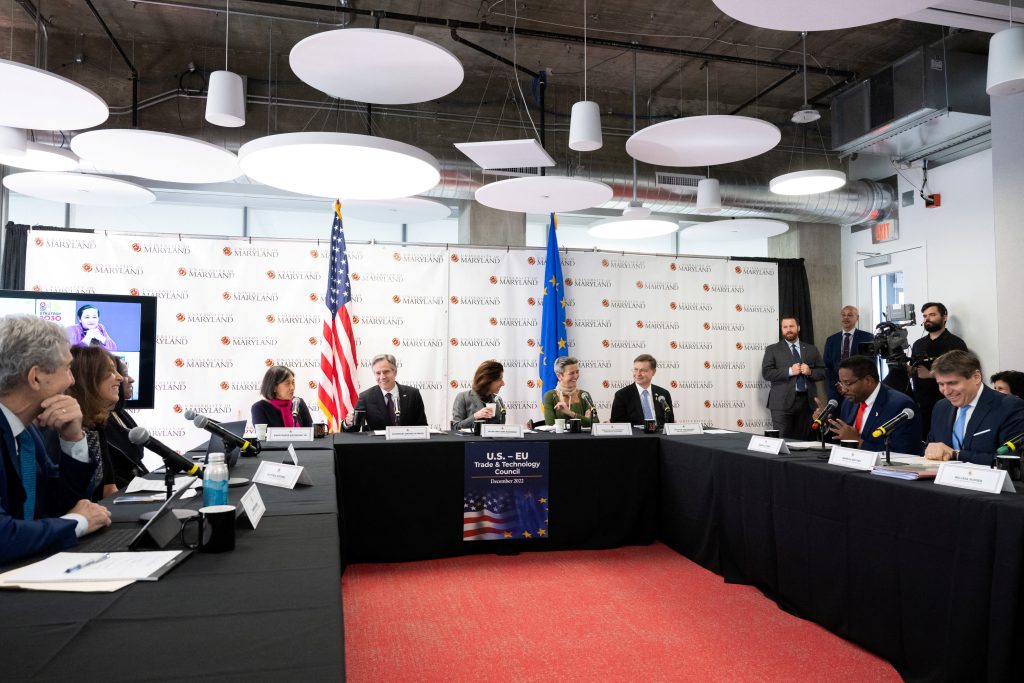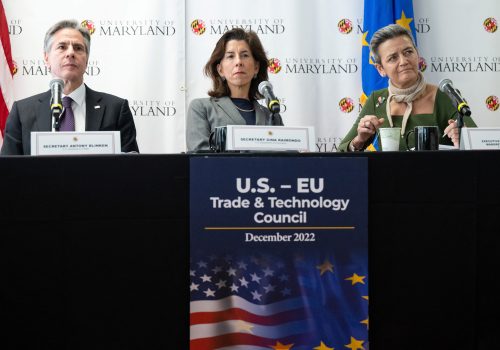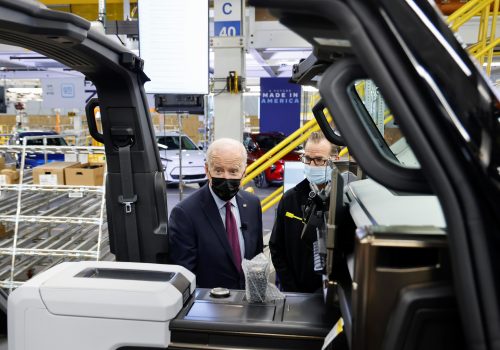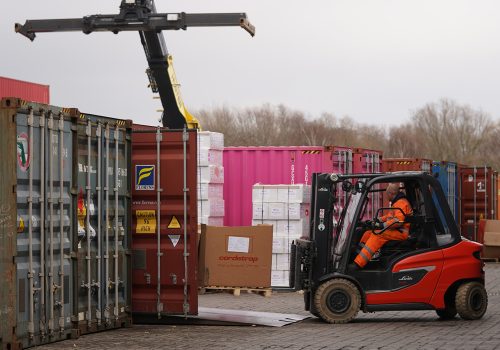Below are US Under Secretary of State for Economic Growth, Energy, and the Environment Jose W. Fernandez’s remarks as prepared for delivery at the Atlantic Council on December 13, 2022. Fernandez joined a discussion hosted by the GeoEconomics Center and Europe Center about the future of the EU-US Trade and Technology Council.
Good morning and thank you for inviting me here today to discuss what I think is one of the most important ways the US and Europe connect: the US-EU Trade and Technology Council, or TTC.
As you know, we recently hosted the third TTC ministerial meeting, where the co-chairs met to discuss progress and advance concrete actions on transatlantic cooperation. I think it really showed the effectiveness of our approach to trade, technology, and innovation.
Right now, the TTC has ten working groups that tackle myriad issues from sustainable, inclusive economic growth to promoting a rules-based economic system. The joint statement we released shows the breadth of our focus and commitment.
Through this forum, we have a ready-made venue to iron out any bumps that occur in our relationship: the US-EU task force on the Inflation Reduction Act, for example, is an effective forum through which we as allies can hash out mutually beneficial results when our approaches don’t meet eye to eye.
We look forward to meeting again in 2023. In the meantime, we’ll keep working toward advancing our ongoing projects and creating new ones. Why? Because transatlantic unity is essential not only for the United States and the EU, but for the world as well. Through the TTC, the US. and the EU are tackling issues critical for global economic prosperity and our shared security.
A lot of folks have questioned what the TTC has accomplished, suggesting this is all whitewashing and doesn’t get to the core of our shared interests. However, that is simply not true. Here I would like to highlight two specific examples in third countries that the TTC is moving forward in this group. They show that we are already making progress beyond issues that the US and EU are targeting. Without the progress we’ve already made, they wouldn’t be possible:
For example, together, we launched new cooperation on inclusive information and communication technology and services (ICTS) projects in Jamaica and Kenya and in cooperation with their respective governments.
In Jamaica, we will connect over one thousand public schools and children’s homes to secure internet services, strengthen digital competencies of teachers, support the use of digital technologies by all types of enterprises, and expand wi-fi infrastructure. We also intend to support secure and resilient rural broadband connectivity provided by trusted vendors in the country.
In Kenya, we will expand school connectivity and provide technical assistance to help Kenya update its Information and Communications Act and 5G strategy in line with the principles set for high-quality global infrastructure projects.
Those are just two concrete examples. Overall, there are five main areas where I think we really showed TTC is the best forum for moving forward our close cooperation:
First, we’re cooperating on new and emerging technologies. We issued both a joint artificial intelligence roadmap that will inform our approaches to risk management and a joint study on the impact of AI on the workforce. We began breaking down barriers to research collaboration needed to expand our understanding and exploitation of quantum information science and technology. As for standards, our working groups hashed out better cooperation on sharing information on international standardization activities and responding to common strategic issues. As for climate change, our two sides developed joint recommendations for government-funded implementation of electric vehicle charging infrastructure, as well as recommendations for future public demonstrations of vehicle-to-grid integration pilots. I think you can agree that this is a lot.
Second, we all know semiconductors are increasingly one of the most important components to modern manufacturing. We’ve now institutionalized the semiconductor supply chain early warning system to mitigate disruptions to the supply chain. TTC also acts as a better forum for exchanging information and developing a common understanding of market dynamics on our respective government support programs for semiconductors.
Third, this isn’t all just trade outputs. We’re advancing the principles of the declaration for the future of the internet—protection of universal human rights and fundamental freedoms, a global internet, and inclusive and affordable access to the internet—which are global in scope. That includes deepening the cooperation between US- and EU-funded emergency plans in support of human-rights defenders worldwide.
Those sound like lofty goals, but they are crucial right now, which leads me to the fourth point: Together we’re assessing with civil society and online platform operators how Russian information manipulation and interference in third-country jurisdictions is affecting the population as a whole. Our values are under attack as we speak, and cooperation is the only way we can combat Russian mis- and disinformation.
Scores of other items are still in the works. The cost of doing business is always an impediment to efficiency and economic growth. We’re sharing best practices to simplify or reduce that cost. Ease of doing business means more mutual recognition agreements and continuing to work on identifying other potential sectors in which strengthened cooperation and conformity could enhance transatlantic trade. Our pooled information on US and EU medical device companies in China will help us better understand and address the impact of China’s non-market policies and impacts on US and EU companies. And we’re also identifying and addressing economic coercion and exploring potential joint efforts, bilaterally and with other like-minded partners.
Fifth and finally, I want to touch on labor and health. We’re launching a new transatlantic initiative on sustainable trade to identify actions in key areas of trade and environmental sustainability that support our shared goals of a green and sustainable future, and to increase transatlantic trade and investment. Beyond that, we’re working together intensively to facilitate the exchange of health information to support research, innovation, and advancements in public health with applicable legal requirements governing the protection of data. By establishing a new “talent for growth” task force that will bring together government and private-sector leaders from business, labor, and organizations, we’ll help provide training with the goal of catalyzing innovative skills policies.
To me, the TTC demonstrates to the world how democratic and market-oriented approaches to trade, technology, and innovation can be a force for greater global prosperity. It prioritizes US and EU joint engagement with industry, labor, and non-governmental stakeholders to foster an inclusive, information-sharing environment that shapes our work to deliver results for workers, businesses, and consumers.
The transatlantic relationship is stronger than ever, as shown by the unprecedented level of cooperation to support Ukraine and hold Putin to account for his brutal war of choice. Remember those two projects in Jamaica and Kenya? They happen because we are working together in this forum to move forward. Transatlantic unity matters not only in the United States and the EU, but also around the world; the United States and EU are working together to address issues that impact the global economy and our shared security interests.
Thank you, and I look forward to a stimulating discussion.
Watch the full event
Further reading
Mon, Dec 5, 2022
The US and EU need a sturdier structure to resolve their trade squabbles
New Atlanticist By Clete R. Willems
Monday’s TTC ministerial meeting did not make major progress on sensitive climate and digital issues. The council needs to evolve now to solve the toughest disputes.
Fri, Dec 2, 2022
The big problems you won’t hear about at the EU-US Trade and Technology Council
New Atlanticist By Kenneth Propp
The TTC’s exclusion of the issues of greatest import in transatlantic economic affairs does not inspire confidence that it will prove to be a lasting institution.
Fri, Dec 2, 2022
Policy memo: How the EU and US should overcome their trade and supply-chain disputes
New Atlanticist By
Ahead of the next meeting of the US-EU Trade and Technology Council, here are five tests for the EU and United States to show progress on the trade and supply-chains agenda.
Image: U.S. Trade Representative Katherine Tai, U.S. Secretary of State Antony Blinken, U.S. Secretary of Commerce Gina Raimondo, European Commission Executive Vice-President Margrethe Vestager and European Commission Executive Vice-President Valdis Dombrovskis participate in a US - EU Stakeholder Dialogue during the Trade and Technology Council (TTC) Ministerial Meeting at the University of Maryland in College Park, Maryland, U.S., December 5, 2022. Saul Loeb/Pool via REUTERS




